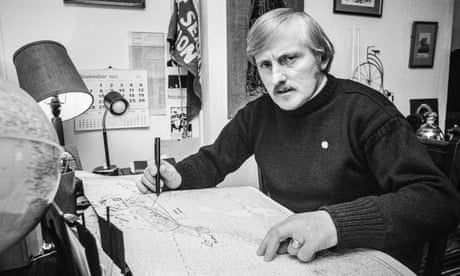
As a boy in Ireland, during the second world war, my husband, Leo Sheridan, who has died aged 89, witnessed a crash into Galway bay of an RAF pilot attempting to avoid the city when his plane developed mechanical problems. He later helped local fishermen to recover the wreck to honour this pilot.
Leo went on to become a fiercely independent investigative journalist and was involved in numerous battles to reveal the truth through the columns of the Guardian and other newspapers. Although he was regularly invited to appear on television and radio, there were those who tried to silence him. His thirst to reveal incidents that threatened the lives and security of others at sea and in the air disturbed governments.
The families and those close to the men who perished on board a Hull deep sea trawler, the Gaul, which disappeared in the Barents Sea in 1974, thanked him for his efforts to find the wreck and traces of its crew. He discovered that the Gaul might have been suspected of espionage by Russia, and could have been sunk by a collision with a submarine, work for which he risked his own life – and liberty. He was arrested on fraud charges, apparently in an effort to silence him, but acquitted unanimously by the jury.
Leo was born in Cork, the fifth of six children. His father, John Sheridan, was Ireland’s representative for the scales manufacturer Avery, and was transferred to Galway when Leo was four. His mother, Elizabeth (nee Harvey), was a talented pianist and organist. When his father died, Leo left school to support his mother financially. But in his late 20s he plunged into accident investigation.
I first met Leo in Galway in the 1970s; he had two children, Mary and Leo, from his first marriage. He and I settled in Hull and our son, Kevin, was born in 1978. Divorce in Ireland was not possible at the time. We eventually decided to marry in 2015.
After leaving Hull, our family moved to Lizard Point in Cornwall, where our daughter, Bridget, was born. Leo highlighted the lack of adequate rescue facilities around the Lizard after the sinking of a coaster during a storm in 1981 and the disastrous loss of the whole crew of the Penlee lifeboat.
Our cottage had a full view over the cliffs and sea off Lizard Point, andLeo helped Falmouth Coastguard by training his binoculars on the dangerous waters, telling them when vessels were giving out distress signals. On a number of occasions he guided the Falmouth coastguard lifeboat by telephone to vessels in trouble. He was much loved and appreciated by Cornish and Hull fishermen alike.
He continued his work for more than 30 years after we left Britain to live in France. He was widely admired for his commitment, courage and perseverance during his investigations. His friend, Paul Brown, the former Guardian environment reporter, said: “Leo exposed wrongdoing that would otherwise have been hidden from public view. In doing so he took considerable risks because many of those he exposed were powerful and sometimes corrupt people.”
Family and friends remember Leo as a beautiful singer and a captivating and humorous storyteller, a good man and a fighter to the end.
Leo is survived by his children, four grandchildren and me.